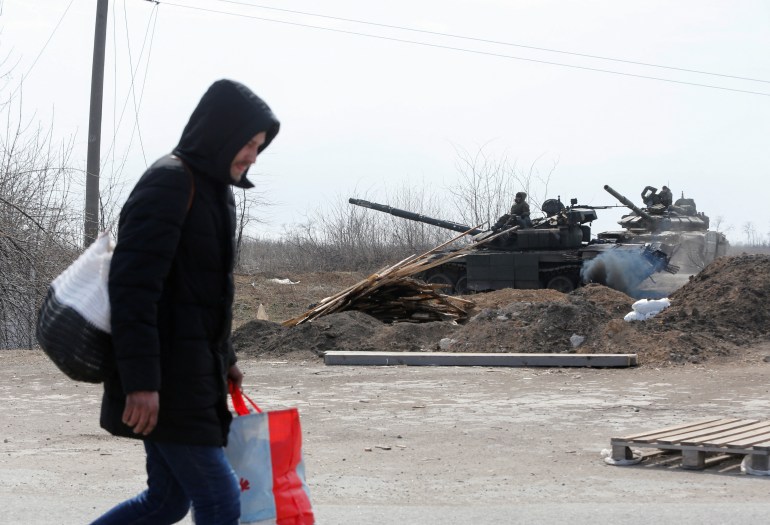US decries ‘disturbing’ accounts of Ukrainians deported to Russia
The US ambassador to the United Nations says it would be ‘unconscionable for Russia to force Ukrainian citizens into Russia’.

Accounts that thousands of residents of Ukraine’s besieged port city of Mariupol have been forcibly deported to Russia are “disturbing” and “unconscionable” if true, US Ambassador to the United Nations Linda Thomas-Greenfield has said.
Speaking on CNN’s “State of the Union” on Sunday, Thomas-Greenfield said the United States had not yet confirmed the allegations made on Saturday by the Mariupol city council via its Telegram channel.
Keep reading
list of 3 itemsRussia says it used hypersonic missiles in Ukraine again
Can talks end the war in Ukraine?
“I’ve only heard it. I can’t confirm it,” she said. “But I can say it is disturbing. It is unconscionable for Russia to force Ukrainian citizens into Russia and put them in what will basically be concentration and prisoner camps.”
Russia launched a large-scale invasion of Ukraine on February 24, igniting a conflict that has led to more than 900 civilian deaths and nearly 1,500 injuries as of March 19, according to the UN human rights office.

Mariupol, a key connection to the Black Sea, has been a target since the start of the war, which Russian President Vladimir Putin calls a “special military operation” to demilitarise and “denazify” Ukraine. Kyiv and the West say Putin launched an unprovoked war of aggression.
The Mariupol city council also said Russian forces bombed an art school on Saturday in which 400 residents had taken shelter, but the number of casualties was not yet known.
The Reuters news agency could not independently verify the reports by the city council. The Russian Embassy in Washington did not respond to a request for comment, but Russia denies targeting civilians.
Ukrainian President Volodymyr Zelenskyy called on Saturday for comprehensive peace talks with Moscow.
The US supports those attempts, Thomas-Greenfield said on Sunday, adding that the negotiations “seem to be one-sided”, with little response from Russia.
The North Atlantic Treaty Organization (NATO) will hold an emergency meeting on Thursday to discuss the conflict and the response of the 30-member alliance.

Poland will formally submit a proposal for a peace-keeping mission in Ukraine at the meeting, Polish Prime Minister Mateusz Morawiecki said last week.
When asked about the Polish proposal, Thomas-Greenfield reiterated President Joe Biden’s commitment to refrain from sending US troops into Ukraine.
“Other NATO countries may decide that they want to put troops inside of Ukraine,” she said. “That will be a decision that they have to make.”
‘Trying to do everything we can’
Estonian Prime Minister Kaja Kallas, speaking on CNN later on Sunday, said she would press NATO to strengthen its military capabilities in Eastern Europe and urge all member countries to devote at least 2 percent of their gross domestic product to defence.
Kallas said the allegations of Ukrainians deported to Russia were reminiscent of thousands of Estonians sent to Siberian labour camps in the 1940s.
“Right now we are in a different position, because we are NATO allies,” she said. “But we are trying to do everything we can to support and help Ukraine to fight this war.”
Turkey is also attempting to mediate a ceasefire in Ukraine, which NATO Secretary-General Jens Stoltenberg praised during an interview on Sunday on NBC’s “Meet the Press”.
“Turkey is doing some real effort to try to facilitate, support talks between Russia and Ukraine,” Stoltenberg said. “It’s far too early to say whether these talks can lead to any concrete outcome.”
Earlier this month, NATO rejected Ukrainian calls to set up a “no-fly zone” over Ukraine to help it protect its skies from Russian missiles and warplanes.
When asked on Sunday whether a no-fly zone would be considered if Russia used chemical weapons in Ukraine, Stoltenberg raised concerns that such a step could escalate the conflict.
“Our allies support Ukraine,” he said. “But at the same time it is extremely important we prevent this conflict from becoming a full-fledged war between NATO and Russia that will cause much more damage, much more death, destruction than what we are seeing now in Ukraine.”